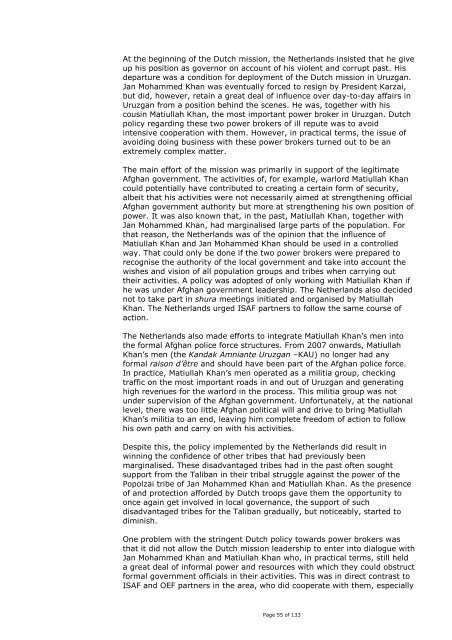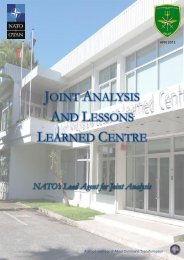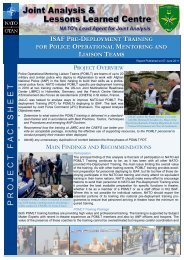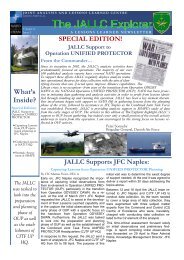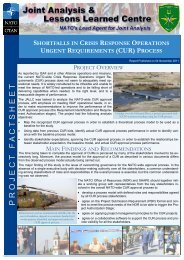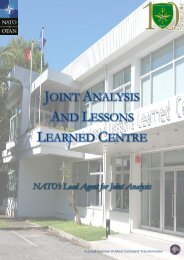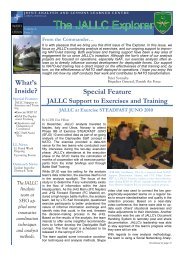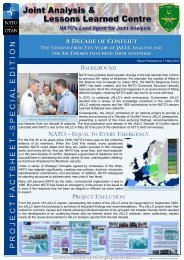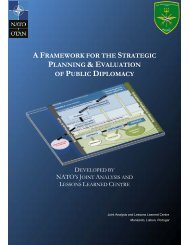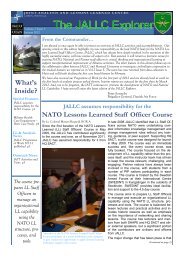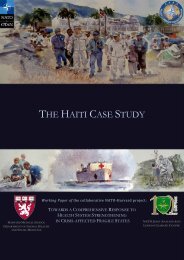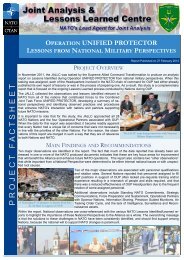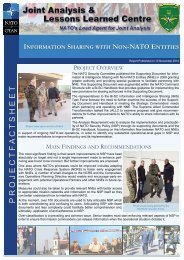eplace him. The appo<strong>in</strong>tment of Munib’s successor, Governor Hamdam,was also <strong>in</strong> l<strong>in</strong>e with Dutch policy. These two governors had no direct ties toUruzgan prov<strong>in</strong>ce and could therefore start their duties with a relativelyclean slate. They were also able to br<strong>in</strong>g disadvantaged tribes back <strong>in</strong>topolitics. At the beg<strong>in</strong>n<strong>in</strong>g of their periods of office, the two men were able toachieve, <strong>in</strong> relative terms, quite a lot; it is therefore <strong>in</strong> those periods thatthe most progress was made regard<strong>in</strong>g good governance.However, <strong>in</strong> both cases, the effectiveness of the two governors dim<strong>in</strong>isheddur<strong>in</strong>g the course of their terms of office. An active first period <strong>in</strong> the termsof both Munib and Hamdam was followed by a period with little activity andless progress. This was partly due to the <strong>in</strong>fluence that <strong>in</strong>formal leaders,such as Jan Mohammed Khan, were able to exert. Informal leaders oftendid not support the policies of Munib and Hamdam and regularly workedaga<strong>in</strong>st local government <strong>in</strong>itiatives. This was a negative <strong>in</strong>fluence on thedevelopment of good governance. In Governor Munib’s case, he was notonly thwarted <strong>in</strong> his efforts by <strong>in</strong>formal leaders <strong>in</strong> Uruzgan but also lost theconfidence of the population, further weaken<strong>in</strong>g his position. Anotherconsequence of the negative <strong>in</strong>fluence of <strong>in</strong>formal leaders was the gradualdecl<strong>in</strong>e <strong>in</strong> the governors’ enthusiasm for mak<strong>in</strong>g greater efforts for theprov<strong>in</strong>ce, result<strong>in</strong>g <strong>in</strong> them appear<strong>in</strong>g less and less <strong>in</strong> the prov<strong>in</strong>ce itself.The complex government position and the <strong>in</strong>fluence of <strong>in</strong>formal leaders onthe government’s endeavours greatly <strong>in</strong>fluenced the effectiveness of theprov<strong>in</strong>cial government.Tackl<strong>in</strong>g corruption was an important part of enhanc<strong>in</strong>g the transparencyand <strong>in</strong>tegrity of local government. The <strong>Netherlands</strong> combated corruption byonly enter<strong>in</strong>g <strong>in</strong>to agreements with reliable partners and by implement<strong>in</strong>gnational programmes with national control mechanisms. At the same time,these partner organisations had a monopoly position, particularly at thebeg<strong>in</strong>n<strong>in</strong>g, ow<strong>in</strong>g to the limited number of actors. There was <strong>in</strong>creas<strong>in</strong>gcorruption due to the availability of large sums of donor funds. Therefore, acritical attitude was adopted and a critical dialogue opened regard<strong>in</strong>g theefforts of these organisations. Cooperation was ended if an organisationwas not function<strong>in</strong>g appropriately and transparently.The <strong>Netherlands</strong> also made efforts at the <strong>in</strong>ternational level <strong>in</strong> ask<strong>in</strong>g formore attention for tackl<strong>in</strong>g corruption. One example of this is that the<strong>Netherlands</strong>, <strong>in</strong> the context of the Afghanistan Reconstruction Trust Fund(ARTF), cont<strong>in</strong>uously requested the World Bank’s attention for the<strong>in</strong>troduction of a system of local responsibility for expenditure of f<strong>in</strong>ancialresources; and, subsequently, for the World Bank to monitor the system.This would act as a control mechanism for better detection of corruption.However, at the end of the mission, it can be concluded that corruption isstill a major problem and is an obstruction to the effectiveness ofgovernment.Sub-conclusion on transparency and <strong>in</strong>tegrityThe perception of the population regard<strong>in</strong>g the <strong>in</strong>tegrity of the prov<strong>in</strong>cialand district government has shown little change for the better. The TLOperception study confirms as much. Confidence <strong>in</strong> local government hasrema<strong>in</strong>ed at a low ebb and the population perceives local civil servants tobe corrupt, poorly qualified for their jobs and guilty of nepotism.4.4.3 Power brokersAs described above, the <strong>in</strong>fluence of <strong>in</strong>formal leaders is a problem for theformal system. In practice, the question of do<strong>in</strong>g bus<strong>in</strong>ess with these powerbrokers proved to be a complex issue. Before the arrival of Dutch militarypersonnel <strong>in</strong> Uruzgan, Jan Mohammed Khan was Governor of the prov<strong>in</strong>ce.Page 54 of 133
At the beg<strong>in</strong>n<strong>in</strong>g of the Dutch mission, the <strong>Netherlands</strong> <strong>in</strong>sisted that he giveup his position as governor on account of his violent and corrupt past. Hisdeparture was a condition for deployment of the Dutch mission <strong>in</strong> Uruzgan.Jan Mohammed Khan was eventually forced to resign by President Karzai,but did, however, reta<strong>in</strong> a great deal of <strong>in</strong>fluence over day-to-day affairs <strong>in</strong>Uruzgan from a position beh<strong>in</strong>d the scenes. He was, together with hiscous<strong>in</strong> Matiullah Khan, the most important power broker <strong>in</strong> Uruzgan. Dutchpolicy regard<strong>in</strong>g these two power brokers of ill repute was to avoid<strong>in</strong>tensive cooperation with them. However, <strong>in</strong> practical terms, the issue ofavoid<strong>in</strong>g do<strong>in</strong>g bus<strong>in</strong>ess with these power brokers turned out to be anextremely complex matter.The ma<strong>in</strong> effort of the mission was primarily <strong>in</strong> support of the legitimateAfghan government. The activities of, for example, warlord Matiullah Khancould potentially have contributed to creat<strong>in</strong>g a certa<strong>in</strong> form of security,albeit that his activities were not necessarily aimed at strengthen<strong>in</strong>g officialAfghan government authority but more at strengthen<strong>in</strong>g his own position ofpower. It was also known that, <strong>in</strong> the past, Matiullah Khan, together withJan Mohammed Khan, had marg<strong>in</strong>alised large parts of the population. Forthat reason, the <strong>Netherlands</strong> was of the op<strong>in</strong>ion that the <strong>in</strong>fluence ofMatiullah Khan and Jan Mohammed Khan should be used <strong>in</strong> a controlledway. That could only be done if the two power brokers were prepared torecognise the authority of the local government and take <strong>in</strong>to account thewishes and vision of all population groups and tribes when carry<strong>in</strong>g outtheir activities. A policy was adopted of only work<strong>in</strong>g with Matiullah Khan ifhe was under Afghan government leadership. The <strong>Netherlands</strong> also decidednot to take part <strong>in</strong> shura meet<strong>in</strong>gs <strong>in</strong>itiated and organised by MatiullahKhan. The <strong>Netherlands</strong> urged <strong>ISAF</strong> partners to follow the same course ofaction.The <strong>Netherlands</strong> also made efforts to <strong>in</strong>tegrate Matiullah Khan’s men <strong>in</strong>tothe formal Afghan police force structures. From 2007 onwards, MatiullahKhan’s men (the Kandak Amniante Uruzgan –KAU) no longer had anyformal raison d’être and should have been part of the Afghan police force.In practice, Matiullah Khan’s men operated as a militia group, check<strong>in</strong>gtraffic on the most important roads <strong>in</strong> and out of Uruzgan and generat<strong>in</strong>ghigh revenues for the warlord <strong>in</strong> the process. This militia group was notunder supervision of the Afghan government. Unfortunately, at the nationallevel, there was too little Afghan political will and drive to br<strong>in</strong>g MatiullahKhan’s militia to an end, leav<strong>in</strong>g him complete freedom of action to followhis own path and carry on with his activities.Despite this, the policy implemented by the <strong>Netherlands</strong> did result <strong>in</strong>w<strong>in</strong>n<strong>in</strong>g the confidence of other tribes that had previously beenmarg<strong>in</strong>alised. These disadvantaged tribes had <strong>in</strong> the past often soughtsupport from the Taliban <strong>in</strong> their tribal struggle aga<strong>in</strong>st the power of thePopolzai tribe of Jan Mohammed Khan and Matiullah Khan. As the presenceof and protection afforded by Dutch troops gave them the opportunity toonce aga<strong>in</strong> get <strong>in</strong>volved <strong>in</strong> local governance, the support of suchdisadvantaged tribes for the Taliban gradually, but noticeably, started todim<strong>in</strong>ish.One problem with the str<strong>in</strong>gent Dutch policy towards power brokers wasthat it did not allow the Dutch mission leadership to enter <strong>in</strong>to dialogue withJan Mohammed Khan and Matiullah Khan who, <strong>in</strong> practical terms, still helda great deal of <strong>in</strong>formal power and resources with which they could obstructformal government officials <strong>in</strong> their activities. This was <strong>in</strong> direct contrast to<strong>ISAF</strong> and OEF partners <strong>in</strong> the area, who did cooperate with them, especiallyPage 55 of 133
- Page 1 and 2:
Final evaluationNetherlands contrib
- Page 3 and 4: High mountainsLow mountainsPlains a
- Page 5 and 6: Table of ContentsDutch military per
- Page 7 and 8: Dutch military personnel deceased i
- Page 9 and 10: Page 9 of 133
- Page 11 and 12: 1 IntroductionThe government would,
- Page 13 and 14: The structure of the final evaluati
- Page 15 and 16: 2 The international presence in Afg
- Page 17 and 18: insurgents in, particularly, the ea
- Page 19 and 20: 3 Netherlands policy for participat
- Page 21 and 22: Netherlands’ presence. Furthermor
- Page 23 and 24: “The objectives of this stabilisa
- Page 25 and 26: In December 2005, the Netherlands g
- Page 27 and 28: The expectation is that meaningful
- Page 29 and 30: 3.6.2 Implementation of national pr
- Page 31 and 32: 4 Implementation of the mission and
- Page 33 and 34: tasks to fulfil in the area of secu
- Page 35 and 36: such as the Bushmaster, that was be
- Page 37 and 38: Afghan partner unit, at all times o
- Page 39 and 40: northern part of Deh Rawod in 2007.
- Page 41 and 42: in large and small bases, while con
- Page 43 and 44: previously thought and comprised a
- Page 45 and 46: Apart from facilitating training an
- Page 47 and 48: If operations in close proximity of
- Page 49 and 50: As previously mentioned, the preven
- Page 51 and 52: - Between 2006 and 2010, the number
- Page 53: government of Chora in January 2010
- Page 57 and 58: intermediary of TLO and political a
- Page 59 and 60: interest for filling judicial posit
- Page 61 and 62: During the Uruzgan mission, a great
- Page 63 and 64: structurally change governance in U
- Page 65 and 66: development programmes. Before the
- Page 67 and 68: also the way in which Afghans perce
- Page 69 and 70: tailored to the real needs of the p
- Page 71 and 72: Gizab had increased and there was a
- Page 73 and 74: The DCU programme devoted and still
- Page 75 and 76: purpose of these loans, cooperative
- Page 77 and 78: In view of the lack of enthusiasm a
- Page 79 and 80: 5 Expenditure for the mission and i
- Page 81 and 82: Overview of long-term expenditure a
- Page 83 and 84: expenditure related to the deployme
- Page 85 and 86: Multi-year expenditure, Foreign Aff
- Page 87 and 88: explosive ordnance disposal, armour
- Page 89 and 90: this situation as constraining, for
- Page 91 and 92: organised at a later stage. In addi
- Page 93 and 94: occupational social workers and the
- Page 95 and 96: Mercedes Benz terrain vehicle, the
- Page 97 and 98: 6 ConclusionsThis chapter begins wi
- Page 99 and 100: The first part of the central quest
- Page 101 and 102: At the end of 2005, the Afghan auth
- Page 103 and 104: province. This, too, was done by me
- Page 105 and 106:
area, increased sales of agricultur
- Page 107 and 108:
ISAF and the OEF led to extra coord
- Page 109 and 110:
d. The recommendations from advisor
- Page 111 and 112:
Page 111 of 133
- Page 113 and 114:
Annex A, Afghanistan Compact Benchm
- Page 115 and 116:
end-2010, reforms will strengthen t
- Page 117 and 118:
Afghan Cultural HeritageA comprehen
- Page 119 and 120:
Private Sector Development and Trad
- Page 121 and 122:
Annex B, Results of the socio-econo
- Page 123 and 124:
EducationTLO data:• In 2006 there
- Page 125 and 126:
Overview of the number of children
- Page 127 and 128:
Annex C, Chronology200522 December:
- Page 129 and 130:
July: microcredit provider World Co
- Page 131 and 132:
Annex D, List of abbreviations3DADZ
- Page 133:
Page 133 of 133


